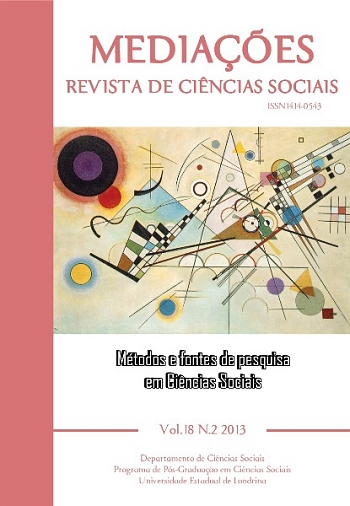Causalidade e mecanismos em ciência política
DOI:
https://doi.org/10.5433/2176-6665.2013v18n2p10Palavras-chave:
Causalidade, Mecanismos, Inferência, Desenho de pesquisaResumo
Esse artigo defende que os desenhos de empíricos de pesquisa em Ciência Política devem ser formatados com o objetivo de produzir inferências causais falsificáveis. Inferir no sentido de utilizar informações disponíveis para apresentar conclusões a respeito de informações indisponíveis. Causais de modo que a ocorrência de altere a probabilidade de ocorrência de. E falsificáveis no sentido de que a inferência pode ser demonstrada falsa por um desenho de pesquisa concorrente. Além disso, as explicações devem identificar o mecanismo causal que conecta variável dependente e variável independente.Downloads
Referências
BRADY, Henry; COLLIER, David (Org.). Rethinking social inquiry: diverse tools, shared standards. Lanham: Rowman & Littlefield, 2004.
BRAMBOR, Thomas; CLARK, William R.; GOLDER Matt. Understanding interaction models: Improving empirical analyses. Political Analysis, Oxford, v. 14, n. 1, p. 63-82, 2006.
BUNGE, Mario. Mechanism and explanation. Philosophy of the Social Science, New York, v. 27, n. 4, p. 410-465, 1997.
CAMPBELL, Donald; STANELY, Julian. Experimental and quasi-experimental designs for research. Chicago, Illinois: Rand McNally, 1996.
DEAN, Angela M.; VOSS, Daniel. Design and analysis of experiments. New York: Springer, 1999.
DELLA PORTA, Donatella; KEATING, Michael (Ed.). Approaches and methodologies in the social sciences: a pluralist perspective. Cambridge: Cambridge University Press, 2008.
ELSTER, Jon. Nuts and bolts for the social sciences. Cambridge: Cambridge University Press, 1989.
FIGUEIREDO FILHO, Dalson; SILVA JUNIOR, José Alexandre; ROCHA, E. O que fazer e o que não fazer com a regressão: pressupostos e aplicações do modelo linear de mínimos quadrados ordinários (MQO). Política Hoje, Recife, v. 20, n. 1, 44-99, 2011.
FRIEDRICH, Robert J. In defense of multiplicative terms in multiple regression equations. American Journal of Political Science, Austin, v. 26, n. 4, p. 797-833, 1982.
GERRING, John. Social science methodology: a criterial framework. Cambridge: Cambridge University Press, 2001.
GERRING, John. Causation: a unified framework for the Social Sciences. Journal of Theoretical Politics, London, v.17, n. 2, p.163-98, 2005.
HEDSTRÖM, Peter; SWEDBERG, Richard. Social mechanisms: an introductory essay. In: HEDSTRÖM, Peter; SWEDBERG, Richard. Social mechanisms: an analytical approach to social theory. New York: Cambridge University Press, 1998.
HOLLAND, Paul. Statistics and causal inference. Journal of the American Statistical Association, Baltimore, v. 81, p. 945-60, 1986.
JACCARD, James; TURRISI, Robert; WAN, Choi. Interaction efects in multiple regression. Newbury Park, CA: Sage, 1990.
KING, Gary; KEOHANE, Robert; VERBA, Sidney. Designing social inquiry: scientific inference in qualitative research. Princeton: Princeton University Press, 1994.
KITSCHELT, Hebert. Accounting for postcommunist regime diversity: what counts as a good cause? In: EKIERT, Grzegorz; HANSON, Stephen E. (Ed.). Capitalism and democracy in central and eastern europe. Cambridge: Cambridge University Press, 2003. p. 49-86.
KUHH, Thomas. A estrutura das revoluções científicas. 3. ed. São Paulo: Perspectiva, 1975.
MAHONEY, James. Path-Dependent explanations of regime change: Central America in comparative perspective. Studies in Comparative International Development, Sant Louis, v. 36, p. 111-141, 2001.
MARSH, David; FURLONG, Paul. A skin not a sweater: ontology and epistemology in political science. In: MARSH, David; STOKER, Gerry. (Ed.). Theory and methods in political science. Basingstoke: Palgrave, 2002. p. 17-44.
MERTON, R. Social theory and social structure. NewYork: The Free Press, 1968.
MONTGOMERY, Douglas. Design and analysis of experiments. 5 th edn. New York: John Wiley & Sons, 2001.
PEARL, Judea. Causality: models, reasoning, and inference. New York: Cambridge University Press, 2000.
RATTON JUNIOR, Jose Luiz; MORAIS, Jorge Ventura de. Para ler Jon Elster: limites e possibilidades da explicação por mecanismos nas Ciências Sociais. DADOS - Revista de Ciências Sociais, Rio de Janeiro, v. 46, n. 2, p. 385-410, 2003.
RUBIN, Donald B. Estimating causal efects of treatments in randomized and nonrandomized studies. Journal of Educational Psychology, Arlington, v. 66, n. 5, p. 688-701, 1974.
SALMON, Wesley. Scientific explanation: three basic conceptions. Proceedings of the biennial Meeting of the Philosophy of Science Association. Symposia and Invited Papers, Chicago, v. 2, p. 293-305, 1984.
SANDERS, David. Behaviouralism. In: MARSH, David; STOKER, Gerry (Ed.). Theory and methods in political science. Basingstoke: Palgrave, 2002. p. 45-64.
SHADISH, R.; COOK, T.; CAMPBELL. Experimental and quasi-experimental Designs of generalized causal inference. New York: Houghton Mifflin Company, 2002.
STINCHCOMBE, Arthur. The conditions of fruitfulness of theorizing about mechanisms in Social Science. Philosophy of the Social Sciences, Waterloo, v. 21, n. 3, p. 367-388, 1991.
TILLY, Charles. Mechanisms in political process. Annual Review of Political Science, Palo Alto, v. 4, p. 21-41, 2001.
VAN EVERA, Stephen. Guide to methods for students of political science. Ithaca, NY: Cornell University Press, 1997.
ZALD, Mayer N. Progress and cumulation in the human sciences after the fall. Sociological Forum, New York, v. 10, n. 3, p. 455-479, 1995.
Downloads
Publicado
Como Citar
Edição
Seção
Licença
Copyright (c) 2014 Dalson Britto Figueiredo Filho, Enivaldo Carvalho da Rocha, José Alexandre da Silva Júnior, Ranulfo Paranhos

Este trabalho está licenciado sob uma licença Creative Commons Attribution 4.0 International License.
Os direitos autorais relativos aos artigos publicados em Mediações são do(a)s autore(a)s; solicita-se aos(às) autore(a)s, em caso de republicação parcial ou total da primeira publicação, a indicação da publicação original no periódico.
Mediações utiliza a licença Creative Commons Attribution 4.0 International, que prevê Acesso Aberto, facultando a qualquer usuário(a) a leitura, o download, a cópia e a disseminação de seu conteúdo, desde que adequadamente referenciado.
As opiniões emitidas pelo(a)s autore(a)s dos artigos são de sua exclusiva responsabilidade.





































